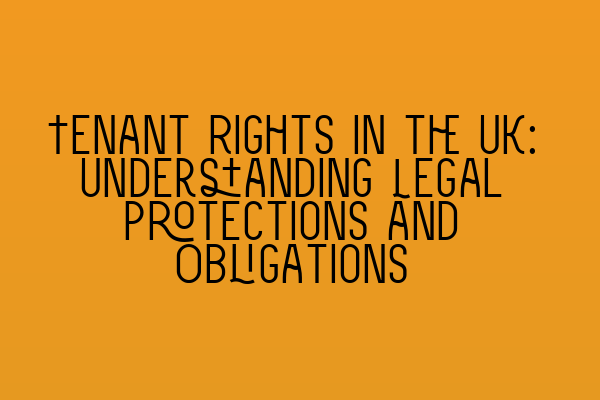Tenant Rights in the UK: Understanding Legal Protections and Obligations
As a tenant in the UK, it is essential to have a comprehensive understanding of your rights and obligations under the law. This knowledge will empower you to navigate your tenancy smoothly and protect yourself from any potential disputes or infringements. In this article, we will delve into the legal framework surrounding tenant rights, highlighting key points you should be aware of.
Security of Tenure
One of the most crucial aspects of tenant rights in the UK is security of tenure. This concept ensures that tenants have the right to remain in their rented property for a specific period, regardless of the landlord’s preferences. It provides stability and protection against abrupt eviction.
Security of tenure is primarily governed by the Housing Act 1988. It distinguishes between two types of tenancies: assured shorthold tenancies and regulated tenancies. Assured shorthold tenancies are the most common type, applicable to tenancies created after 28 February 1997, while regulated tenancies are older, pre-1989 tenancies with additional protections.
Protection Against Unfair Eviction
While landlords hold the right to regain their property in certain circumstances, they must follow specific eviction procedures. As a tenant, you are protected against unfair eviction or harassment.
Under the Coronavirus Act 2020, temporary measures have been put in place to protect tenants during the COVID-19 pandemic. These measures include longer notice periods for eviction, banned eviction bailiffs during lockdown, and the suspension of possession proceedings in some cases. It is important to stay updated on any changes to these temporary measures.
If you believe that your landlord is evicting you unfairly or harassing you, it is advisable to seek legal advice promptly to understand your rights and explore potential remedies. SQE Property Law & Land Law offers comprehensive guidance on tenant rights and can assist you in such situations.
Rent Increase Regulations
As a tenant, you are protected against arbitrary and unreasonable rent increases. The law mandates that landlords can only increase the rent under specific circumstances and through certain prescribed procedures. These procedures vary based on the type of tenancy and can include providing notice and justifying the proposed increase.
It is crucial to carefully review your tenancy agreement and understand your rights regarding rent increases. If you have concerns or believe that your landlord is acting unreasonably, legal advice can help you navigate the situation and ensure your rights are protected.
Maintenance and Repairs
Landlords have a legal obligation to maintain the property in a habitable condition and carry out necessary repairs. This includes ensuring that the property meets basic health and safety standards, such as the provision of heating, proper sanitation facilities, and a structurally sound building.
If you encounter maintenance or repair issues, your first course of action should be to inform your landlord or their appointed property management agency in writing. If they fail to address the issues promptly, seeking legal advice can help you understand your options and compel your landlord to fulfill their obligations.
At SQE Property Law & Land Law, we provide expert guidance on tenant rights, ensuring you are well-informed and protected throughout your tenancy. Our experienced solicitors are well-versed in this area of law and can assist you in any housing-related matter.
Conclusion
Understanding your tenant rights is essential for a successful tenancy. By familiarizing yourself with the legal protections and obligations, you can navigate any challenges that arise during your renting journey. Remember, in case of any doubts or disputes, seeking professional legal advice is always beneficial.
For more information on relevant legal topics and exam preparation courses, be sure to check out our related articles:
